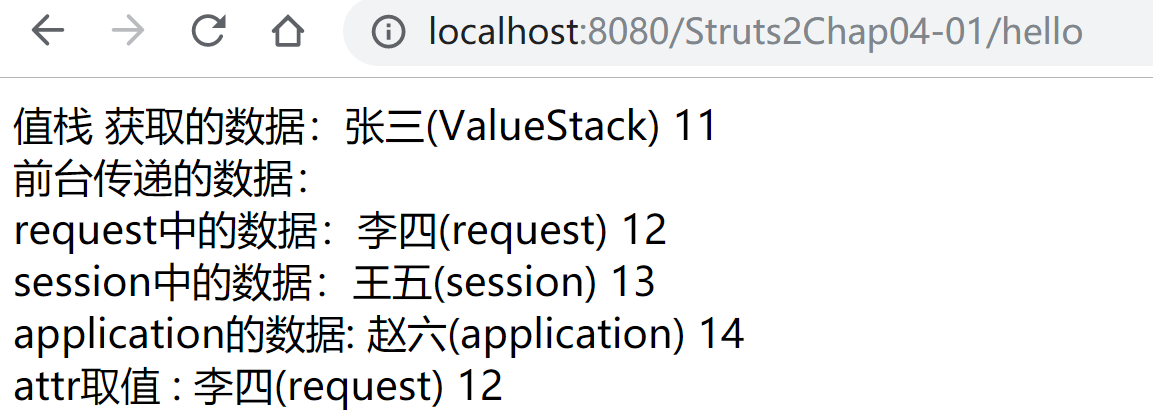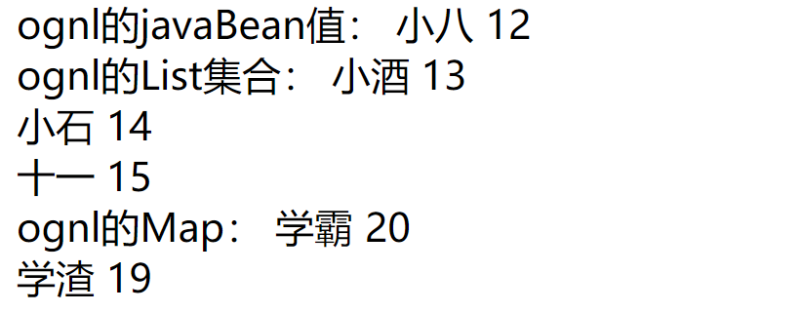Struts2的值栈和OGNL牛逼啊
Struts2的值栈和OGNL牛逼啊
一 值栈简介:
值栈是对应每个请求对象的一套内存数据的封装,Struts2会给每个请求创建一个新的值栈,值栈能够线程安全的为每个请求提供公共的数据存取服务。
二 OGNL介绍:
(1)基本数据:
OGNL 是对象图导航语言 Object-GraphNavigationLanguage 的缩写,它是一种功能强大的表达式语言。
OGNL 访问 ValueStack 数据 <s:propertyvalue=”account”/>
OGNL 访问 ActionContext 数据
访问某个范围下的数据要用#
#parameters 请求参数 request.getParameter(...);
#request 请求作用域中的数据 request.getAttribute(...);
#session 会话作用域中的数据 session.getAttribute(...);
#application 应用程序作用域中的数据 application.getAttribute(...);
#attr 按照 page request session application 顺序查找值
我们以例子理解这部分内容,设置HelloAction:
public class HelloAction extends ActionSupport{
private static final long serialVersionUID = 1L;
@Override
public String execute() throws Exception {
//狭义上的值栈
ActionContext actionContext=ActionContext.getContext();
ValueStack valueStack=actionContext.getValueStack();
valueStack.set("name", "张三(ValueStack)");
valueStack.set("age", 11);
//session中的值
Map<String, Object> session=actionContext.getSession();
session.put("name","王五(session)");
session.put("age","13");
//application中的内容
Map<String, Object> application=actionContext.getApplication();
application.put("name", "赵六(application)");
application.put("age","14");
return SUCCESS;
}
}
Struts.xml文件的配置:
<struts>
<constant name="struts.ognl.allowStaticMethodAccess" value="true"></constant>
<package name="manage" namespace="/" extends="struts-default">
<action name="hello" class="com.java1234.Action.HelloAction">
<result name="success" >success.jsp</result>
</action>
</package>
</struts>
前端页面success.jsp
<%@ page language="java" contentType="text/html; charset=utf-8"
pageEncoding="utf-8"%>
<%@taglib prefix="s" uri="/struts-tags" %>
<!DOCTYPE html PUBLIC "-//W3C//DTD HTML 4.01 Transitional//EN" "http://www.w3.org/TR/html4/loose.dtd">
<html>
<head>
<meta http-equiv="Content-Type" content="text/html; charset=utf-8">
<title>Insert title here</title>
</head>
<%
request.setAttribute("name", "李四(request)");
request.setAttribute("age", "12");
%>
<body>
值栈 获取的数据:<s:property value="name"/>
<s:property value="age"/>
<br/>
前台传递的数据:<s:property value="#parameters.name"/>
<s:property value="#parameters.age"/>
<br/>
request中的数据:<s:property value="#request.name"/>
<s:property value="#request.age"/>
<br/>
session中的数据:<s:property value="#session.name"/>
<s:property value="#session.age"/>
<br/>
application的数据: <s:property value="#application.name"/>
<s:property value="#application.age"/>
<br/>
attr取值 : <s:property value="#attr.name"/>
<s:property value="#attr.age"/>
<br/>
</body>
</html>
首先,是取值方式<s:property value="方式"/>,
①值栈 直接取 比如说是name age 就可以使用这种方式 value=”name” value=”age”
②page页面传递的数据 比如说是name age 使用这种方式 value="#parameters.name” value="#parameters.age”
③requset 设置的值 使用的方式 value="#request.name" value="#request.age"
④session设置的值使用的方式 value="#session.name" value="#session.age"
⑤application设置的值使用的方式 value="#application.name" value="#application.age"
之后attr的取值方式是按照 page request session applicaiton这个顺序取得。
例如:attr获取的是request的值

(2)OGNL 访问静态方法和属性
Mystatic类:
public class MyStatic {
public static final String str="yxs";
public static String printUrl(){
System.out.println("http://www.yxs.com");
return "http://www.yxs.com";
}
}
Static.jsp直接访问:
<body>
访问静态属性: <s:property value="@com.java1234.common.MyStatic@str"/><br/>
访问静态方法:<s:property value="@com.java1234.common.MyStatic@printUrl()"/>
</body>
结果:

(3)OGNL 访问复杂对象
我们以javaBean对象为例:Student类
public class Student {
private String name;
private int age;
public Student() {
super();
// TODO Auto-generated constructor stub
}
public Student(String name, int age) {
super();
this.name = name;
this.age = age;
}
public String getName() {
return name;
}
public void setName(String name) {
this.name = name;
}
public int getAge() {
return age;
}
public void setAge(int age) {
this.age = age;
}
}
Success.jsp文件:
<html>
<body>
ognl的javaBean值: <s:property value="student.name"/>
<s:property value="student.age"/>
<br/>
ognl的List集合: <s:property value="students[0].name"/>
<s:property value="students[0].age"/>
<br/>
<s:property value="students[1].name"/>
<s:property value="students[1].age"/>
<br/>
<s:property value="students[2].name"/>
<s:property value="students[2].age"/>
<br/>
ognl的Map: <s:property value="studentMap['goodStudent'].name"/>
<s:property value="studentMap['goodStudent'].age"/>
<br/>
<s:property value="studentMap['badStudent'].name"/>
<s:property value="studentMap['badStudent'].age"/>
<br/>
</body>
</html>
HelloAction文件代码:
public class HelloAction extends ActionSupport{
private static final long serialVersionUID = 1L;
private Student student;//javaBean
private List<Student>students;//list
private Map<String,Student>studentMap;//Map
public Student getStudent() {
return student;
}
public void setStudent(Student student) {
this.student = student;
}
public List<Student> getStudents() {
return students;
}
public void setStudents(List<Student> students) {
this.students = students;
}
public Map<String, Student> getStudentMap() {
return studentMap;
}
public void setStudentMap(Map<String, Student> studentMap) {
this.studentMap = studentMap;
}
@Override
public String execute() throws Exception {
// TODO Auto-generated method stub
students=new ArrayList<Student>();
student=new Student("小八",12);
students.add(new Student("小酒",13));
students.add(new Student("小石",14));
students.add(new Student("十一",15));
studentMap=new HashMap<String,Student>();
studentMap.put("goodStudent", new Student("学霸",20));
studentMap.put("badStudent", new Student("学渣",19));
return SUCCESS;
}
}
显示结果:

Struts2的值栈和OGNL牛逼啊的更多相关文章
- Struts2知识点小结(三)--值栈与ognl表达式
1.问题一 : 什么是值栈 ValueStack 回顾web阶段 数据交互问题? 客户端提交数据 到 服务器端 request接受数据+BeanUtils实体封装 ...
- 走进Struts2(五)— 值栈和OGNL
值栈 1.值栈是什么? 简单说:就是相应每个请求对象的轻量级的内存数据中心. Struts2引入值栈最大的优点就是:在大多数情况下,用户根本无须关心值栈,无论它在哪里,不用管它里面有什么,仅仅须要去获 ...
- struts2(二)值栈 threadlocal ogal ui
值栈(重要)和ognl表达式 1. 只要是一个mvc框架,必须解决数据的存和取的问题 2. Struts2利用值栈来存数据,所以值栈是一个存储数据的内存结构 3. 把数据存在值栈中,在页面上利用 ...
- 关于Struts2中的值栈与OGNL表达式
1.1.1 OGNL概述: Object Graphic Navigation Language(对象图导航语言)的缩写 * EL :OGNL比EL功能强大很多倍. 它是一个开源项目. ...
- Struts2基础学习(七)—值栈和OGNL
目录: 一.值栈 二.OGNL表达式 一.值栈(ValueStack) 1.定义 ValueStack贯穿整个Acton的生命周期,每个Action类的对象实例都拥有一个ValueStack ...
- Struts2学习记录-Value Stack(值栈)和OGNL表达式
仅仅是学习记录.把我知道的都说出来 一.值栈的作用 记录处理当前请求的action的数据. 二,小样例 有两个action:Action1和Action2 Action1有两个属性:name和pass ...
- Struts2 的 值栈和ActionContext
1.ValueStack 和 ActionContext 的关系与区别: -- 相同点:它们都是在一次HTTP请求的范围内使用的,它们的生命周期都是一次请求 -- 不同点:ValueStack 分为对 ...
- Struts2的值栈和对象栈
ValueStack 如何得到值栈: 如何将对象存入值栈: 让值栈执行表达式来获得值: 在JSP中跳过栈顶元素直接访问第二层: 在JSP中访问值栈对象本身(而不是它们的属性) ActionContex ...
- 值栈与ognl
ValueStack (值栈): 1.贯穿整个Action的生命周期(每个Action类的对象实例都拥有一个ValueStack对象).相当于一个数据的中转站.在其中保存当前Action对象和其他相关 ...
随机推荐
- PJSIP-iOS源码编译
官方文档https://trac.pjsip.org/repos/wiki/Getting-Started/iPhone 功能 在iPhone上可以实现的功能: 包含基于CoreAudio的音频设备, ...
- SniperOj-shorter-shellcode-x86
shell-storm 这里可以有一些可以用的shellcode,不过自己写才是biner的骄傲 /奋斗 0x00 不会写shellcode(和一条咸鱼有什么区别/哭) 0x01 这题目前有俩种解法 ...
- oracle row_number的使用
create table studentInfo( id number(8) primary key, name varchar2(20) not null, ObjectName varcha ...
- 命令行发送UDP
https://www.cnblogs.com/Dennis-mi/articles/6866762.html: 如果往本地UDP端口發送數據,那麼可以使用以下命令:echo “hello” > ...
- Linux下基于LVM调整分区容量大小的方法
Linux下调整分区容量大小的方法(适用于centos6-7) 说明:以下方法均使用centos6.9和centos7.4进行测试. Centos6分区容量调整方法 1.web分区空间不足,新添加一块 ...
- TB平台搭建之三
有简单到复杂,可以简单的决不复杂化,事情从可控开始,即使再好的技术如果不可控最好不要用否则以后的debug可能比较麻烦. 无论是搭建平台还是写复杂的case都是尽量从简单开始,不要上来复杂,否则deb ...
- python datetime,time时间格式和用法
我是转载的这个大神的 他的网址:https://www.cnblogs.com/wanglinjie/p/9226926.html #以下是time的方法 >>> import ...
- server 08 R2 NBL 报错:RPC 服务器在指定计算机上不可用
排查步骤如下: 1.检查并确保 Remote Procedure Call (RPC) 和 Remote Procedure Call (RPC) Locator这两项服务是否都已经启动 2.确认此2 ...
- kali-set
Set 简介 开源的社会工程学利用套件,通常结合metasploit(部分)来使用 更改 /etc/setoolkit下的配置文件 set_config BLEEDING_EDGE="Fal ...
- matalb sum函数和sum变量的用法
在对矩阵或者向量求和要用到sum函数的时候代码里面千万不要出现将sum作为变量名
